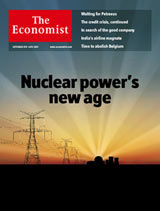Carbon tax, not subsidies, will spur nuclear power
Carbon tax, not subsidies, will spur nuclear power
mongabay.com
September 9, 2007
|
|
A U.S. carbon tax, not government subsidies, should be used to spur investment in nuclear power, says The Economist.
In its “Leaders” editorial section, the UK-based financial publication states that concerns over global warming and energy security may well spawn a new era for nuclear power, but that tax-payers should not be asked to foot the bill for building plants as they have in the past. The editorial notes that while nuclear power plants have high upfront costs, once operational, they produce cheap, carbon-free energy. Though there are valid concerns about proliferation and the handling of nuclear waste, The Economist argues that new designs and technologies are cutting maintenance and repair costs for nuclear plants while safety is improving. It says the general public — even some in the environmental lobby — is warming to the idea of nuclear power.
These points aside, The Economist says that the best way to see whether nuclear has a future is to level the playing field for energy through a carbon tax. Such a tax would force energy producers to bear the full cost of the damages wrought by pollution and greenhouse gas emissions. Nuclear and renewable energy sources — wind, solar, and geothermal — would see the biggest gains in terms of price competitivenss with conventional energy sources.
 |
“[T]he economics of nuclear still look uncertain. That’s partly because its green virtues do not show up in its costs, since fossil-fuel power generation does not pay for the environmental damage it does. But it is also because nuclear combines huge fixed costs with political risk. Companies fear that, after they have invested billions in a plant, the political tide will turn once more and bankrupt them. Investors therefore remain nervous.
How, then, to get new plants built? America’s solution is to lard the industry with money. That is the wrong answer.
Nuclear and other clean energy sources do indeed deserve a hand from governments—but through a carbon tax which reflects the benefits of clean energy, not through subsidies to cover political risk. Exposure to public nervousness is a cost of doing business in the nuclear industry, just as exposure to volatile prices is a cost in the gas industry…
One of the reasons why the public turned against nuclear power last time round is that it found itself bailing the industry out. It would be wrong, not just for taxpayers but also for the industry, to set up another lot of cosy deals with governments. The nuclear industry needs to persuade people that it is clean, cheap and safe enough to rely on without a government crutch. If it can’t, it doesn’t deserve a second chance.
Related Articles
Nobel prize winner debates future of nuclear power
(6/7/2007) Two renowned energy experts sparred in a debate over nuclear energy Wednesday afternoon at Stanford University. Amory Lovins, Chairman and Chief Scientist of the Rocky Mountain Institute, an energy think tank, argued that energy efficiency and alternative energy sources will send nuclear power the way of the dinosaurs in the near future. Dr. Burton Richter, winner of the 1976 Nobel Prize in physics, said that nuclear would play an important part of the future energy portfolio needed to cut carbon emissions to fight global warming.
Nuclear power plants are financially risky given high costs
(4/4/2007) Nuclear power plants are risky investments given rapidly rising costs of construction of nuclear fuel, reports a new study by researchers from Georgetown University, Stanford University and UC Berkeley.